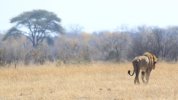Hogpatrol
AH ambassador
- Joined
- Apr 13, 2013
- Messages
- 8,765
- Reaction score
- 28,436
- Location
- Delaware, USA
- Media
- 96
- Articles
- 5
- Member of
- Atglen Sportsmen's Club, NRA, SCI
- Hunted
- RSA, DE, NJ, PA, KS, TX, ME
Obama administration enacts protections for lions

By KEVIN FREKING 23 minutes ago

.
View gallery
WASHINGTON (AP) — The Obama administration's decision to extend Endangered Species Act protections for two breeds of lions is a turning point for the lions now roaming Africa, say advocacy groups who petitioned the federal government to list the lion as endangered.
The U.S. Fish and Wildlife Service signaled in a document obtained by the Associated Press that it would classify the lion as threatened or endangered across its entire range in Africa. The agency has scheduled a noon conference call to discuss its findings.
The listings are accompanied by a directive that appears to touch on circumstances surrounding the killing of a well-known lion named Cecil in Zimbabwe earlier this year. The order states that the Fish and Wildlife Service will deny a permit to import a sport-hunted lion to anyone who has been convicted or pleaded guilty to violating federal or state wildlife laws.
Walter Palmer, the Minnesota dentist who shot Cecil with a bow and arrow, had pleaded guilty in 2008 to making false statements to the Fish and Wildlife Service about a black bear fatally shot in western Wisconsin outside an authorized hunting zone.
The Fish and Wildlife Service cautioned against linking the order with Cecil's death, describing the action instead as a redoubling of efforts to ensure that violators of wildlife laws don't reap future benefits from importing wildlife and wildlife products.
The administration signaled it would protect lions in Africa long before Cecil's case caught the public's attention. The Fish and Wildlife Service proposed a rule in October 2014 to list the African lion as threatened. After getting feedback, the agency revised its findings.
It determined that two subspecies of lions live in Africa. One group, found primarily in western and central countries, is more genetically related to the Asiatic lion. Only about 1,400 remain in Africa and India. The agency is listing that subspecies as endangered, meaning it risks extinction.
View gallery

File-This Sept. 8, 2015, file photo shows Walter Palmer arriving at River Bluff Dental clinic in Blo …
A second subspecies, numbering between 17,000 and 19,000 and found across southern and eastern Africa, will be listed as threatened.
The Endangered Species Act requires the Fish and Wildlife Service to list species as endangered or threatened regardless of the country where they live.
"If we want to ensure that healthy lion populations continue to roam the Africa savannas and forests of India, it's up to all of us — not just the people of Africa and India — to take action," said Dan Ashe, the agency's director.
The listings will bring extra protection for both subspecies: A permit would be required before importing any live or sport-hunted lions. The bar for an import permit would be highest with the endangered group, with permits granted if importing the animal would enhance the species' survival.
The permitting process for the threatened group would require the import to come from nations that have sound conservation practices and use trophy hunting revenue to sustain lion populations and deter poaching. Currently, sport hunters don't need a permit from the U.S. to bring in a trophy lion.
The Humane Society of the United States projects that American trophy hunters imported 5,647 lions in the past decade. The group's president and CEO, Wayne Pacelle, said he expects that the regulations will make it much harder to bring lion hides back to the U.S, thus removing a key motivation for hunters.
"If a particular hunt is not associated with a broader conservation program, it can't come in," Pacelle said.
Ashe said trophy hunting can and does contribute to the survival of species in the wild as part of a well-managed conservation program. The new permitting requirements in the U.S. will encourage African countries to improve their lion management programs. The agency said hundreds of sport-hunted trophy lions are brought into the U.S. each year.
The agency already has authority to deny an import permit to individuals who have violated federal and state wildlife laws. Ashe's order essentially turns that authority into a requirement.
"Importing sport-hunted trophies and other wildlife or animal parts into the United States is a privilege, not a right, a privilege that violators of wildlife laws have demonstrated they do not deserve," Ashe said.
The agency said its investigation into the Cecil's killing is ongoing and declined to comment directly on the case.
Cecil was a major tourist attraction in Hwange National Park and was being monitored as part of an Oxford University study. Palmer said he shot the big cat outside the park's borders, but it didn't die immediately and was tracked down the next day.
Palmer said he would not have shot the animal if anybody in the hunting party has known of the lion's status. Zimbabwe officials cleared Palmer of wrongdoing in October, saying he didn't break the country's hunting laws.

By KEVIN FREKING 23 minutes ago

.
View gallery
WASHINGTON (AP) — The Obama administration's decision to extend Endangered Species Act protections for two breeds of lions is a turning point for the lions now roaming Africa, say advocacy groups who petitioned the federal government to list the lion as endangered.
The U.S. Fish and Wildlife Service signaled in a document obtained by the Associated Press that it would classify the lion as threatened or endangered across its entire range in Africa. The agency has scheduled a noon conference call to discuss its findings.
The listings are accompanied by a directive that appears to touch on circumstances surrounding the killing of a well-known lion named Cecil in Zimbabwe earlier this year. The order states that the Fish and Wildlife Service will deny a permit to import a sport-hunted lion to anyone who has been convicted or pleaded guilty to violating federal or state wildlife laws.
Walter Palmer, the Minnesota dentist who shot Cecil with a bow and arrow, had pleaded guilty in 2008 to making false statements to the Fish and Wildlife Service about a black bear fatally shot in western Wisconsin outside an authorized hunting zone.
The Fish and Wildlife Service cautioned against linking the order with Cecil's death, describing the action instead as a redoubling of efforts to ensure that violators of wildlife laws don't reap future benefits from importing wildlife and wildlife products.
The administration signaled it would protect lions in Africa long before Cecil's case caught the public's attention. The Fish and Wildlife Service proposed a rule in October 2014 to list the African lion as threatened. After getting feedback, the agency revised its findings.
It determined that two subspecies of lions live in Africa. One group, found primarily in western and central countries, is more genetically related to the Asiatic lion. Only about 1,400 remain in Africa and India. The agency is listing that subspecies as endangered, meaning it risks extinction.
View gallery

File-This Sept. 8, 2015, file photo shows Walter Palmer arriving at River Bluff Dental clinic in Blo …
A second subspecies, numbering between 17,000 and 19,000 and found across southern and eastern Africa, will be listed as threatened.
The Endangered Species Act requires the Fish and Wildlife Service to list species as endangered or threatened regardless of the country where they live.
"If we want to ensure that healthy lion populations continue to roam the Africa savannas and forests of India, it's up to all of us — not just the people of Africa and India — to take action," said Dan Ashe, the agency's director.
The listings will bring extra protection for both subspecies: A permit would be required before importing any live or sport-hunted lions. The bar for an import permit would be highest with the endangered group, with permits granted if importing the animal would enhance the species' survival.
The permitting process for the threatened group would require the import to come from nations that have sound conservation practices and use trophy hunting revenue to sustain lion populations and deter poaching. Currently, sport hunters don't need a permit from the U.S. to bring in a trophy lion.
The Humane Society of the United States projects that American trophy hunters imported 5,647 lions in the past decade. The group's president and CEO, Wayne Pacelle, said he expects that the regulations will make it much harder to bring lion hides back to the U.S, thus removing a key motivation for hunters.
"If a particular hunt is not associated with a broader conservation program, it can't come in," Pacelle said.
Ashe said trophy hunting can and does contribute to the survival of species in the wild as part of a well-managed conservation program. The new permitting requirements in the U.S. will encourage African countries to improve their lion management programs. The agency said hundreds of sport-hunted trophy lions are brought into the U.S. each year.
The agency already has authority to deny an import permit to individuals who have violated federal and state wildlife laws. Ashe's order essentially turns that authority into a requirement.
"Importing sport-hunted trophies and other wildlife or animal parts into the United States is a privilege, not a right, a privilege that violators of wildlife laws have demonstrated they do not deserve," Ashe said.
The agency said its investigation into the Cecil's killing is ongoing and declined to comment directly on the case.
Cecil was a major tourist attraction in Hwange National Park and was being monitored as part of an Oxford University study. Palmer said he shot the big cat outside the park's borders, but it didn't die immediately and was tracked down the next day.
Palmer said he would not have shot the animal if anybody in the hunting party has known of the lion's status. Zimbabwe officials cleared Palmer of wrongdoing in October, saying he didn't break the country's hunting laws.
Attachments
Last edited by a moderator:







